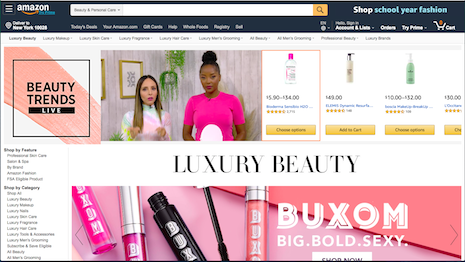 Amazon is wooing luxury brands to sell via its platform, but has not met with much success. That has not stopped the retailer from launching its Luxury Beauty department online. Image credit: Amazon
Amazon is wooing luxury brands to sell via its platform, but has not met with much success. That has not stopped the retailer from launching its Luxury Beauty department online. Image credit: Amazon
Last month, the United States Department of Justice announced an antitrust investigation of big tech.
U.S. Treasury Secretary Steve Mnuchin followed up in a CNBC interview, loudly endorsing the antitrust scrutiny: He said that Amazon has not only “destroyed the retail industry across the United States” but that it has also hurt competition. Mr. Mnuchin was on the board of Sears, incidentally.
This raised hackles among retail industry observers, who say the weak are just being culled from the herd.
Amazon’s response was, not surprisingly, strident in its defense.
I would like to respond to two of Amazon’s points, as it often leaves out crucial facts. Specifically, Amazon said:
- “Amazon is a small percent of all retail.”Amazon’s boilerplate response to any accusation of domination is that most of U.S. retail is still transacted in local stores.
While that is technically true, the denominator is misleading because it includes the grocery industry, which is nearly a trillion dollars and the lone area in retail where Amazon has struggled.
Exclude grocery, and the story looks very different.
I estimate that more than 60 percent of the total sales – all sales, not just online sales – in the media and computer hardware categories are transacted on Amazon.
Even a category such as toys sees 25 percent of its volume in the Everything Store.
One more point here: No matter what Amazon says about its sales, it is the top source of information for shoppers researching many products, such as consumer electronics or baby products. And a nontrivial amount of that information is outright false or misleading, because that is just how marketplaces work.
So when Amazon tries to argue that it has no influence on retail and certainly not a bad one, I would argue to the contrary.
- “Amazon helps small and medium businesses (SMBs).”Amazon says that because its small third-party sellers are growing, that is a win for all SMBs.
Every year, Forrester receives no shortage of complaints from companies saying that Amazon has disintermediated its best merchant partners by going directly to brands to source products and then pricing them as loss leaders to gain market share.
The E.U. is doing its own investigation into exactly this issue.
Meanwhile, Amazon’s SMB growth does not appear to be coming from enterprising, entrepreneurial Americans or Europeans, but rather unscrupulous Chinese merchants selling poor-quality products or stealing the IP of others.
All this said, let us go back to the bigger statement: Has Amazon really destroyed the retail industry?
Destroyed is a strong word. Retail is very much alive. Thank you, Apple, Walmart, Target, Costco, Lululemon, and so many others.
At the same time, it is critical to recognize that Amazon’s success is due to the fact that it has exploited a slew of gray areas in business that others – for example, Circuit City, Borders, or Toys ‘R’ Us, which have simultaneously perished – have not.
For years, Amazon was able to avoid forcing customers to pay sales taxes for online orders. Its white- and blue-collar employees notoriously work in brutal environments; its Echo devices violate consumer privacy; and there are no shortage of products that violate counterfeit and IP regulations.
And Amazon has done all this legally because of no laws, slow laws, or outright unfair laws – i.e., Section 230, which exonerates platforms from third-party misbehavior – that favor Amazon and its big tech brethren.
IS AN ANTITRUST lawsuit the right stick? There is likely something compelling there – surely predatory pricing and reseller fairness – but any antitrust fine or action alone will not level the playing field between Amazon and other retailers.
Antitrust will not target Amazon’s other questionable – yet legal – behavior such as consumer privacy violations, opaqueness in reporting its financials, harsh labor conditions, and violations of consumer product safety and truth in advertising, all of which desperately need scrutiny and oversight from a consortium of government agencies such as the U.S. Department of Labor, the Federal Trade Commission, the Securities and Exchange Commission, and Congress.
Government officials need to start drafting new rules to close these loopholes immediately because, ultimately, those issues harm consumers and employees, not just competitors.
 Sucharita Kodali is vice president and principal analyst at Forrester
Sucharita Kodali is vice president and principal analyst at Forrester
Sucharita Kodali is Charlotte, NC-based vice president and principal analyst at Forrester. This post originally appeared here. Reproduced with permission. For more from Forrester on retail, please click here.
